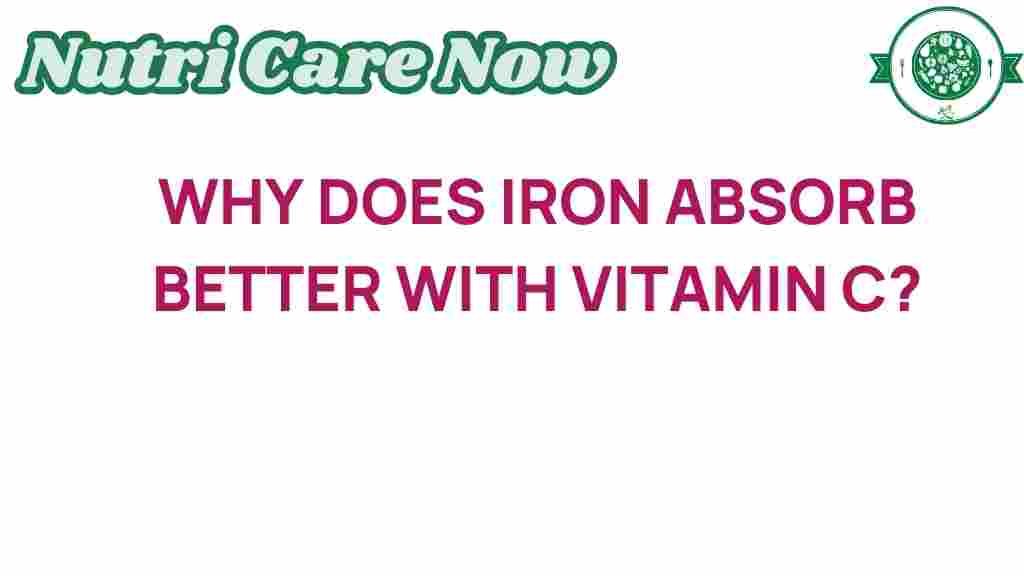Unveiling the Secret: Why Iron Absorbs Better with Vitamin C
In the realm of nutrition, understanding how to maximize the absorption of essential nutrients is crucial for maintaining optimal health. One of the most discussed pairings in the world of vitamins and minerals is that of iron and vitamin C. This article will explore the relationship between these two vital nutrients, focusing on how vitamin C enhances iron absorption, the health benefits of this combination, dietary tips to improve your nutrient intake, and more. Whether you’re dealing with iron deficiency or simply looking to bolster your immune support, this guide will provide valuable insights.
Understanding Iron Absorption
Iron is an essential mineral that plays a crucial role in various bodily functions, including:
- Transporting oxygen in the blood
- Supporting energy production
- Maintaining a healthy immune system
However, not all forms of dietary iron are easily absorbed by the body. There are two types of dietary iron:
- Heme Iron: Found in animal products like meat and fish, heme iron is absorbed more efficiently by the body.
- Non-Heme Iron: Found in plant-based foods like beans, lentils, and spinach, non-heme iron has a lower absorption rate.
Understanding these differences is essential for those at risk of iron deficiency, particularly vegetarians, vegans, and individuals with increased iron needs.
The Role of Vitamin C in Iron Absorption
Vitamin C, also known as ascorbic acid, is a powerful antioxidant that offers numerous health benefits. One of its most significant roles is enhancing the absorption of non-heme iron. When vitamin C is consumed alongside non-heme iron sources, it converts iron into a form that is easier for the body to absorb. This synergy between vitamin C and iron underscores the importance of incorporating both nutrients into your diet.
Health Benefits of Iron and Vitamin C
Combining iron with vitamin C offers a range of health benefits, including:
- Improved Iron Absorption: As discussed, vitamin C significantly boosts the absorption of non-heme iron, helping to prevent iron deficiency anemia.
- Enhanced Immune Support: Both iron and vitamin C play vital roles in immune function. Adequate iron levels are necessary for the production of immune cells, while vitamin C enhances their activity.
- Increased Energy Levels: With better iron absorption, your body can produce more hemoglobin, leading to improved oxygen transport and energy levels.
- Antioxidant Protection: Vitamin C is a powerful antioxidant that helps protect cells from damage caused by free radicals.
Dietary Tips for Optimal Iron Absorption
To ensure you are getting the most out of your iron and vitamin C intake, consider the following dietary tips:
1. Pair Iron-Rich Foods with Vitamin C Sources
When planning meals, be mindful of combining iron-rich foods with those high in vitamin C. Here are some excellent pairings:
- Spinach salad with orange slices
- Stir-fried tofu with bell peppers
- Lentil soup with tomatoes
- Beef tacos topped with avocado and lime juice
2. Opt for Whole Food Sources
Whole foods not only provide essential nutrients but also come with additional health benefits. Choose:
- Lean meats and fish for heme iron
- Legumes, nuts, and seeds for non-heme iron
- Citrus fruits, strawberries, and bell peppers for vitamin C
3. Be Mindful of Inhibitors
Certain foods and beverages can inhibit iron absorption. Limit the intake of:
- Coffee and tea during meals
- Dairy products (calcium competes with iron for absorption)
- High-fiber foods in large quantities (they can bind iron)
4. Consider Cooking Methods
Cooking methods can also impact the availability of iron. For example:
- Cooking in cast iron pans can increase iron content in food.
- Steaming or sautéing vegetables can enhance their nutrient availability.
Identifying and Addressing Iron Deficiency
Iron deficiency is one of the most common nutritional deficiencies worldwide. Symptoms may include:
- Fatigue and weakness
- Pale skin
- Shortness of breath
- Dizziness or lightheadedness
If you suspect you have iron deficiency, it’s important to consult a healthcare professional. They may recommend:
- Blood tests to assess iron levels
- Dietary changes to increase iron and vitamin C intake
- Iron supplements if necessary
Common Troubleshooting Tips
Here are some troubleshooting tips if you’re struggling with iron absorption:
1. Review Your Diet
Ensure you are consuming a balanced diet that includes sufficient iron and vitamin C. Keeping a food diary can help identify any gaps.
2. Timing Matters
Consider the timing of your meals. Eating vitamin C-rich foods before or during meals can enhance iron absorption, especially for plant-based iron sources.
3. Consult a Professional
If dietary changes don’t improve your iron levels, consult a nutritionist or dietitian. They can provide personalized advice tailored to your needs.
Conclusion
In conclusion, understanding the relationship between iron and vitamin C is key for anyone looking to improve their nutrition and overall health. By enhancing iron absorption, vitamin C plays a pivotal role in preventing iron deficiency, supporting immune health, and boosting energy levels. Remember to incorporate both nutrients into your diet through strategic food pairings, mindful cooking methods, and awareness of dietary inhibitors.
For more information on dietary tips and improving your nutrition, check out this comprehensive guide on essential nutrients. And for further reading on the health benefits of vitamin C, you can visit this informative article.
With the right dietary choices, you can unlock the full potential of iron and vitamin C, paving the way for better health and well-being.
This article is in the category Health and created by NutriCareNow Team
